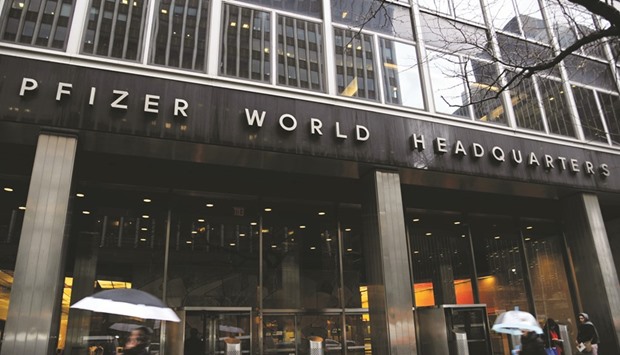Pfizer decided not to split in two separate companies, opting against what could have been one of the biggest breakups in the drug industry’s history after four years of it called an “extensive evaluation.”
The decision follows the collapse of Pfizer’s attempted $160bn merger with Allergan in April, a deal that would have shifted the company’s tax address overseas and bulked up one of the units before a split. In recent months, New York-based Pfizer had signalled it might stay together.
The question now is what’s next for the biggest drugmaker in the US, and whether it can rely on dealmaking and new products to rekindle growth after a series of patent expirations on key products led to years of declining sales. The drugmaker most recently agreed to a $14bn deal to acquire Medivation and its cancer treatments.
“More transactions seem likely,” Tim Anderson, an analyst at Sanford C Berstein who rates the shares outperform, wrote in a note to investors. “A critic could argue that Pfizer is back to being the same old Pfizer as before, relying on M&A to grow and to refill its pipeline.”
Investors have been waiting for a decision since 2012, when a Goldman Sachs Group analyst suggested the company should split. Soon after, Pfizer began reorganising its business into what eventually became two distinct units - one cash-generating business with older and off-patent medicines, and another growth-focused operation with products dependent on more recent research and development.
In recent months though, the drugmaker had indicated it was leaning against a complete separation of the two businesses. Four years ago, when Pfizer first considered a breakup, revenue was declining. Now the company is benefiting from strong sales from some of its newest drugs - especially the cancer treatment Ibrance, which beat analysts’ estimates after its introduction.
“Much like every other drug company right now, we’re focused on the pipeline and some of their new very important drug launches,” said David Heupel, a Minneapolis-based fund manager at Thrivent Financial for Lutherans, which holds Pfizer among its $100bn of assets. “While they’re a little behind their peers, we think they’re making some strides in immuno-oncology, which could have some significant revenue potential down the road.”
The shares fell 1% to $33.92 in New York. Pfizer’s stock has gained 52% since March 2012, when the drugmaker indicated at a meeting with Goldman Sachs analysts that it may be willing to consider a breakup. That’s comparable to the 53% increase in the Standard & Poor’s 500 Index in the same period, but well below the 96% jump in the S&P Health Care Sector Index. “Clearly there is some disappointment” about the decision not to break up the company, said Alex Arfaei, an analyst at BMO Capital Markets who advises buying Pfizer. “To their credit they’ve been gradually lowering expectations so this shouldn’t be shocking to anybody. They’ve been preparing the market for this.”
By operating two separate and autonomous units, Pfizer already has access to the potential benefits of a split, Chief Executive Officer Ian Read said Monday in a statement. The drugmaker will also preserve its option to separate “should factors materially change at some point in the future.”

Pedestrians walk past Pfizer headquarters in New York. Pfizer has decided not to split in two separate companies, opting against what could have been one of the biggest breakups in the drug industry’s history after four years of it called an u201cextensive evaluation.u201d
